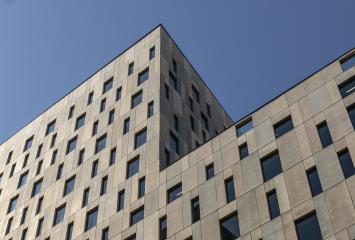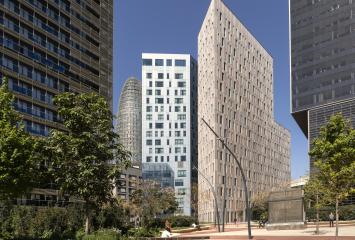Coworking Trends for 2023
The latest report on the Status of Coworking in Spain shows an increase in this corporate/professional practice: In 2021, it increased by 39%. And, in the absence of official figures for all of 2022, studies such as Randstad's Employer Brand Research point in the same direction. Coworking is here to stay. Among other reasons, this is due to its flexibility, which permits it to gradually adapt to the new needs of companies, professionals and society. New services emerge. New attitudes. New trends. And these are the ones that will grow in the coming years:
Unique interiors
There are many reasons for which companies and freelance professionals decide to hire coworking spaces. The synergies and cross-cutting interactions, the technological and spatial benefits, the ease of concentration... And many times the primary driver is the desire to work in an environment that is aesthetically stimulating. For this reason, Coworking companies are investing more and more energy in developing unique interior designs. Utopicus is one example The elegance of its offices on Barcelona's Avenida Diagonal sharply contrasts with the colorful freshness of its offices on Madrid's Paseo de la Habana.
From forest to office
The trend of incorporating more and more greenery in offices has been growing for many years, and it is no longer possible to imagine 21st century buildings or urban planning without it. The workplace needs greenery. And, accordingly, specific greenery that goes with the specific interior design of each space. From the hanging plants of Utopicus Gran Vía to the tree that dominates the large adaptable room of Utopicus Francisco Silvela, and including the omnipresence of indoor plants in the offices of Utopicus Glòries in Barcelona, one of the work spaces with the best connection to nature in the city.
More leisure space
The human-centric office design is intended for human-centric companies who understand that the wellbeing of employees is not just a moral priority but also boosts their concentration, their creativity, and ultimately their performance. Hence coworking environments are increasingly choosing to integrate leisure spaces where company employees and freelancers can actively disconnect. Cafeterias, gyms, game rooms, and terraces from which they can quietly contemplate the sea, as in the Utopicus offices in Torre Marenostrum. The integration of work and leisure is key.
Connection to other services
However, not just that particular type of integration. In fact, overall integration is an aspiration that is becoming more and more common in the coworking world every year. For those using the offices and open work spaces, their location near bus, train or subway stations makes life much easier for them. So does the fact that there are services nearby that coworking cannot offer, such as fitness centers, restaurants and cafés, supermarkets, libraries or even psychology clinics. The idea is to create micro-worlds in which to work comfortably. As happens at Utopicus Gal·la Placídia or Utopicus Plaça Catalunya.
The technological development of spaces
The technological development of spaces is obvious and inevitable. However, office environments such as coworking facilities must take the lead in this progress. And that is exactly what they are doing. This includes solutions such as installing facial recognition equipment for their users, the implementation of voice assistants in both operational and breakout areas, the integration of management software for more efficient job performance, and even the implementation of artificial intelligence technologies. Coworking spaces will have to become cutting-edge facilities offering technologies that are not available anywhere else.
Creating non-niche communities
In the early years of coworking, the trend was to gather professionals from the same or closely related industries in each space in order to generate networking. The new trend is different: The general opinion now is that companies and professionals can benefit greatly from contact with companies and professionals from other very different industries. The feedback does not necessarily have to be direct. There can be a more indirect mutual benefit based on the stimulation of interacting with different sectors. This is already happening in Utopicus offices such as José Abascal or Príncipe de Vergara in Madrid. The symbiosis is already underway.

